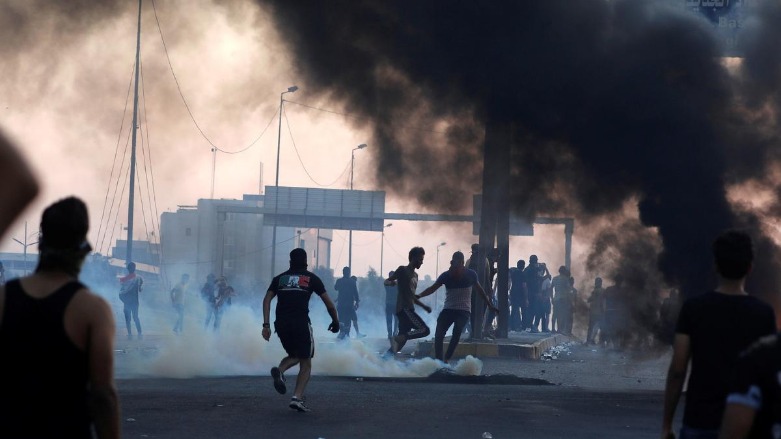At least 5 dead as protests continue; police make arrests

ERBIL (Kurdistan 24) – Close to half a dozen people were killed in violent protests on Saturday evening in the Iraqi capital of Baghdad as demonstrations that began on Tuesday continued for a fifth day.
Protests in the capital came after the city started a day of relative calm compared to previous ones, which, along with similar public expression of discontent in other parts of the country, reportedly saw 100 people killed and up to 3,870 others injured, according to UN figures.
Local media outlets reported that protesters in central Baghdad had been killed by sniper fire. Witnesses said the security forces fired live rounds above the crowd in attempts to disperse them. Police also detained hundreds of demonstrators but released them shortly after.
Protesters have also reportedly torched several offices belonging to different political parties, including the Dawa Party, of which the former Iraqi Prime Minister, Nouri al-Maliki, is a member.
Crowds also took to the streets in the provinces of Najaf, al-Qadisiyyah, Dhi Qar, and others. Protests in the city of Diwaniya, Dhi Qar’s capital, saw the death of one person and injury of at least 10others as local security forces dispersed demonstrators.
Massive demonstrations took place in the Iraqi capital of Baghdad on Tuesday and continued on Wednesday across several provinces, with protestors demanding job opportunities, improved public services, and an end to institutional corruption.
On Thursday evening, Prime Minister Adil Abdul Mahdi responded to the protests by promising a minimum income scheme for Iraqi citizens.
“The protesters have the right to demand an end to corruption, but it takes time for change to take place,” he said
Read More: Iraqi PM promises reform as protest death tolls surge
The prime minister asserted there was no “magic solution” to the problems of governance and abuse of power in Iraq but vowed to try to pass a law that would give low-income families a basic income.
On Friday, influential cleric Muqtada al-Sadr – who commands a coalition that makes up about half of parliament – called for snap elections and the resignation of Abdul Mahdi’s government. Sadr also blamed politicians in general for the violence that has engulfed the country, the worst since the incumbent PM’s predecessor proclaimed the so-called Islamic State defeated in late 2017.
Editing by Karzan Sulaivany
